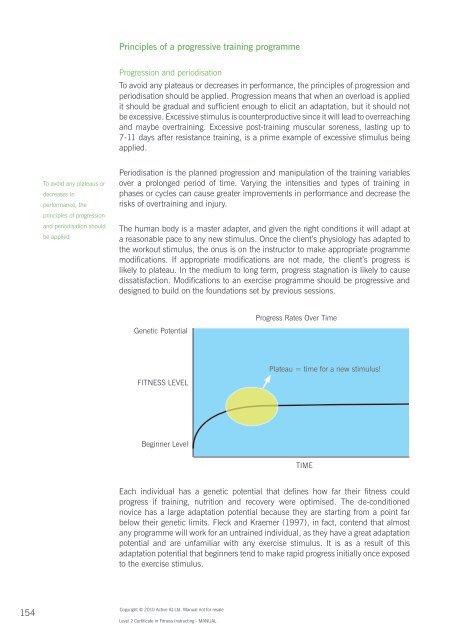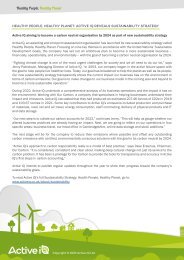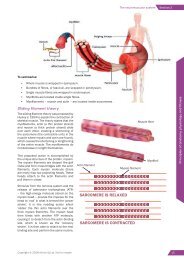Active IQ Level 2 Certificate in Fitness Instructing (Children) (sample manual)
For more information, please visit http://www.activeiq.co.uk/qualifications/level-2/active-iq-level-2-certificate-in-fitness-instructing-(children)
For more information, please visit http://www.activeiq.co.uk/qualifications/level-2/active-iq-level-2-certificate-in-fitness-instructing-(children)
Create successful ePaper yourself
Turn your PDF publications into a flip-book with our unique Google optimized e-Paper software.
Pr<strong>in</strong>ciples of a progressive tra<strong>in</strong><strong>in</strong>g programme<br />
Progression and periodisation<br />
To avoid any plateaus or decreases <strong>in</strong> performance, the pr<strong>in</strong>ciples of progression and<br />
periodisation should be applied. Progression means that when an overload is applied<br />
it should be gradual and sufficient enough to elicit an adaptation, but it should not<br />
be excessive. Excessive stimulus is counterproductive s<strong>in</strong>ce it will lead to overreach<strong>in</strong>g<br />
and maybe overtra<strong>in</strong><strong>in</strong>g. Excessive post-tra<strong>in</strong><strong>in</strong>g muscular soreness, last<strong>in</strong>g up to<br />
7-11 days after resistance tra<strong>in</strong><strong>in</strong>g, is a prime example of excessive stimulus be<strong>in</strong>g<br />
applied.<br />
To avoid any plateaus or<br />
decreases <strong>in</strong><br />
performance, the<br />
pr<strong>in</strong>ciples of progression<br />
and periodisation should<br />
be applied<br />
Periodisation is the planned progression and manipulation of the tra<strong>in</strong><strong>in</strong>g variables<br />
over a prolonged period of time. Vary<strong>in</strong>g the <strong>in</strong>tensities and types of tra<strong>in</strong><strong>in</strong>g <strong>in</strong><br />
phases or cycles can cause greater improvements <strong>in</strong> performance and decrease the<br />
risks of overtra<strong>in</strong><strong>in</strong>g and <strong>in</strong>jury.<br />
The human body is a master adapter, and given the right conditions it will adapt at<br />
a reasonable pace to any new stimulus. Once the client’s physiology has adapted to<br />
the workout stimulus, the onus is on the <strong>in</strong>structor to make appropriate programme<br />
modifications. If appropriate modifications are not made, the client’s progress is<br />
likely to plateau. In the medium to long term, progress stagnation is likely to cause<br />
dissatisfaction. Modifications to an exercise programme should be progressive and<br />
designed to build on the foundations set by previous sessions.<br />
Genetic Potential<br />
Progress Rates Over Time<br />
Plateau = time for a new stimulus!<br />
FITNESS LEVEL<br />
Beg<strong>in</strong>ner <strong>Level</strong><br />
TIME<br />
Each <strong>in</strong>dividual has a genetic potential that def<strong>in</strong>es how far their fitness could<br />
progress if tra<strong>in</strong><strong>in</strong>g, nutrition and recovery were optimised. The de-conditioned<br />
novice has a large adaptation potential because they are start<strong>in</strong>g from a po<strong>in</strong>t far<br />
below their genetic limits. Fleck and Kraemer (1997), <strong>in</strong> fact, contend that almost<br />
any programme will work for an untra<strong>in</strong>ed <strong>in</strong>dividual, as they have a great adaptation<br />
potential and are unfamiliar with any exercise stimulus. It is as a result of this<br />
adaptation potential that beg<strong>in</strong>ners tend to make rapid progress <strong>in</strong>itially once exposed<br />
to the exercise stimulus.<br />
154<br />
Copyright © 2010 <strong>Active</strong> <strong>IQ</strong> Ltd. Manual not for resale<br />
<strong>Level</strong> 2 <strong>Certificate</strong> <strong>in</strong> <strong>Fitness</strong> Instruct<strong>in</strong>g - MANUAL

















